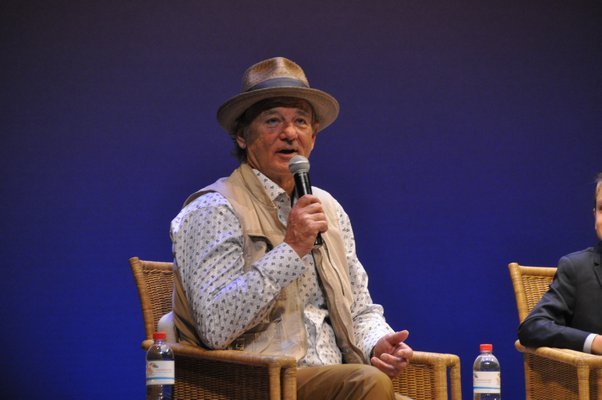
Bill Murray is a force. He makes people sweat. He holds his own. And when the actor stepped onto the red carpet last Thursday night, October 9, at Guild Hall, he turned the head of every single paparazzo and ticketholder waiting outside the East Hampton theater.
Just under two hours later, following the screening of his most recent project, “St. Vincent”—which opened the 22nd annual Hamptons International Film Festival—Mr. Murray moseyed onto the stage with writer-director Theodore Melfi and 11-year-old co-star Jaeden Lieberher.
The entire theater burst into applause, whistles and shouts as the audience got to its feet.
“That was a warm welcome, but you don’t have to do that. I’m here every night,” David Nugent, the festival’s artistic director, quipped, taking a seat opposite the talent behind the film. It follows the story of Vincent (Mr. Murray), a retired curmudgeon who joins with Daka (Naomi Watts), a pregnant stripper, to become an unlikely babysitter team for Jaeden’s character, Oliver—the 12-year-old son of Maggie (Melissa McCarthy), his single mother, who moves them to Brooklyn.
Mr. Melfi explained that the story is hatched from one main experience in his life. Eight years ago, his oldest brother died and left behind an 11-year-old daughter, whom the director and his wife adopted, effectively relocating her from Tennessee to Los Angeles.
Mixed with a huge dose of fiction, the film brought the cast and crew to New York—Mr. Melfi’s childhood stomping grounds—for a very hot summer in Williamsburg, Fort Greene, Bay Ridge and Sheepshead Bay.
“So, Bill, I’d love to ask you what you did to prepare for this role,” Mr. Nugent said.
“Uhhh,” he droned, “I’m not one of those actors.”
The audience burst into laughter. “I understand you rode your bike a lot, back and forth around Brooklyn,” Mr. Nugent encouraged.
“Yeah, I’m that kind,” Mr. Murray said.
“Can I ask you what appealed to you about the script?” Mr. Nugent tried.
“I just want to say what a beautiful room this is,” Mr. Murray said, disregarding the question altogether. “It’s a beautiful theater. It’s really nice.”
He paused and decided to cooperate—kind of.
“Well, I think all the actors, we had a really great cast,” he said. “Terrance [Howard] as the bad guy, Melissa McCarthy as the neighbor, and Naomi Watts as the slut.”
“The woman who works at night, I believe,” Mr. Nugent said, quoting the way Oliver describes Daka’s profession.
“Yes, well, there’s some night workers here,” Mr. Murray muttered.
“No, no, no, no,” Mr. Nugent shook his head, his cheeks turning red.
“I know a little bit about the Hamptons. Just raise your hand, that’s all,” Mr. Murray said. “He’s blushing. What a beautiful tan you have, David.”
The moderator quickly changed the subject, asking Jaeden about his experience working with Mr. Murray. “It was … It was …” the boy said slowly, considering his answer.
“Louder, Jade!” the veteran actor commanded.
“It was nerve-wracking!” Jaeden shouted.
“Anyone in particular wrack your nerves there?”
Jaeden pointed to his right. “Bill.”
“Yes, he’s wracking mine,” Mr. Nugent said.
“But I got comfortable with it, and it was really fun.”
During the film’s climax, Oliver makes a speech in front of several hundred people—the entire scene resting on Jaeden’s shoulders—with confidence and calm. Before going on set, he was anything but.
“So, Bill took me aside, and we meditated and ate candy,” Jaeden said of what Mr. Murray taught him. “I learned to relax a little bit. And not much acting. Bill’s not the best to learn from.”
“We do have time for a response,” Mr. Nugent said, and added, after a silent second, “Or not.”
“I’m thinking,” Mr. Murray growled, before eventually explaining, “If I had to guess, he probably had to do [that scene] 65 times. He hung in there like a grizzled piece of bad meat. And he’s fantastic. He’s beautiful.
“So what he taught me was, as we all know, nobody likes a whiner,” he continued. “But I think he taught me that, or reminded me, I guess, if you really love your work, you can do it no matter what the conditions are.”
As Mr. Nugent looked out into the audience for more questions, Mr. Murray pointed out a woman shrugging on her coat. “How many people would really like to stand up and go now?” he asked, the clock pushing 10:30 p.m. “We’re going to need five more people who want to stand up and go.”
In an auction-like style, he quickly counted the raised hands down to one. With that, he pushed himself out of his chair and announced, “Let’s get the hell out of here.”